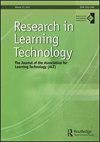颠覆性创新视角下的学生在线评估观点
IF 1.2
Q2 EDUCATION & EDUCATIONAL RESEARCH
引用次数: 5
摘要
本文分析了学生对网络评估的想法和感受。本文以领导力课程为例,以颠覆性创新理论为视角,分析学生对在线评估的反应。本文的数据来源包括年度课程评估调查、一次性评估调查和焦点小组。采用定向方法进行定性内容分析来分析数据。结果显示,学生有能力进行一系列在线评估,但总体而言,不愿利用不同形式的在线评估的创新可能性。本文通过将在线评估置于一个独特的理论框架中,增加了我们对在线评估的理解,并解释了为什么学生可能不寻求创新的评估形式。本文章由计算机程序翻译,如有差异,请以英文原文为准。
A Disruptive Innovation perspective on students’ opinions of online assessment
This article analyses students’ thoughts and feelings about online assessment. This article uses Disruptive Innovation theory as a lens through which to analyse students’ responses to online assessment, in a case study of a Leadership course. The sources of data for this article comprise annual course evaluation surveys, a one-off assessment survey and a focus group. Qualitative content analysis with a directed approach is used to analyse the data. The results show students are capable of undertaking a range of online assessments but are, in general, reluctant to utilise the innovative possibilities of different forms of online assessment. This article adds to our understanding of online assessment by placing it within a distinct theoretical framework, offering explanations for why students may not be seeking-out innovative forms of assessment.
求助全文
通过发布文献求助,成功后即可免费获取论文全文。
去求助
来源期刊

Research in Learning Technology
EDUCATION & EDUCATIONAL RESEARCH-
CiteScore
6.50
自引率
0.00%
发文量
13
审稿时长
20 weeks
 求助内容:
求助内容: 应助结果提醒方式:
应助结果提醒方式:


